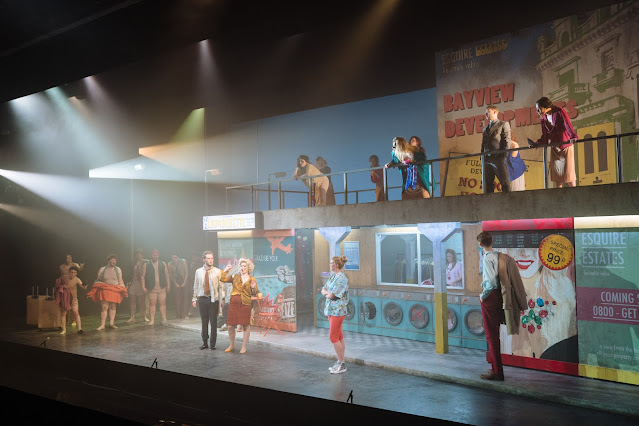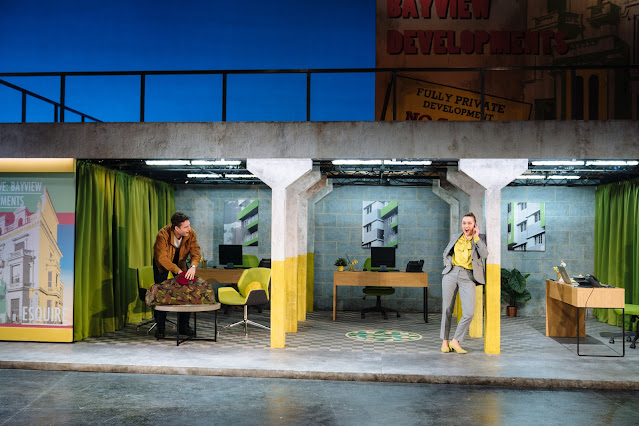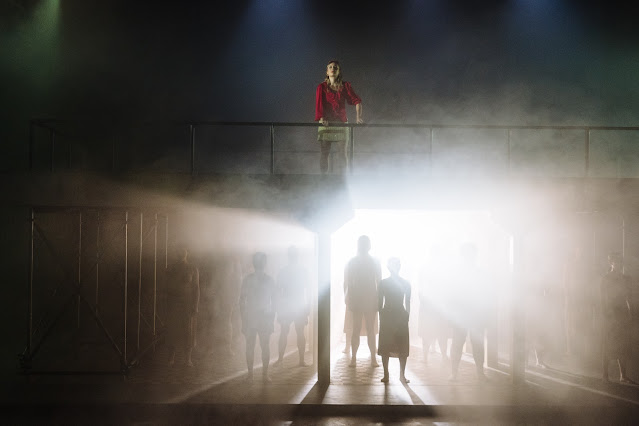 |
| Judith Weir: Miss Fortune - final scene - Guildhall School of Music and Drama (Photo Helen Murray) |
Menotti The Telephone, Judith Weir Miss Fortune; director Martin Lloyd-Evans, conductor Dominic Wheeler; Guildhall School of Music and Drama
Reviewed by Robert Hugill on 2 March 2022
A double bill that paired Menotti's verbal comedy with a successful reinvention of Judith Weir's opera
Judith Weir's opera Miss Fortune premiered at the Bregenz Festival in 2011 in a production by Chen Shi-Zheng that debuted at Covent Garden in 2012. Seeing the piece for the first time at Covent Garden in 2012, the combination of work, theatre and production seemed almost like a match made in hell, the work seemed somewhat lost in the theatre and the brash production only made things worse. I wondered why Covent Garden had not staged the opera in the Linbury Theatre, as it seemed to cry out for a more intimate stage. Now, in what seems to be the work's first revival since 2012, Guildhall School of Music and Drama is presenting Judith Weir's Miss Fortune at their Silk Street Theatre in a production directed by Martin Lloyd-Evans, with designs by Anna Reid, and conducted by Dominic Wheeler, in a double bill with Menotti's The Telephone. Both works were double cast and we caught the performance on Wednesday 2 March 2022 with Ellie Neate and Jack Holton in The Telephone, and Jacob Harrison, Laura Fleur, Cleo Lee McGowan, Kieron-Connor Valentine, Innocent Masuku, Amy Holyland, and Jonathan Eyers in Miss Fortune
Miss Fortune is based on a Sicilian folk tale, and Weir's own libretto abstracts the story and creates a sort of moral fable that rather reminded me of Georg Kaiser's From Morning to Midnight and David Sawer's brave attempt to turn it into an opera in 2001 at English National Opera. Again we have a protagonist, Tina, who goes through a series of scenes peopled more by archetypes, yet stalked by Fate. But Weir's ending turns things on its head. And Weir takes her characters seriously, the work lacks the mordant wit and sarcasm of German Expressionism, there is a warmth to her writing for all the characters, we feel sorry for Tina's parents, Lord and Lady Fortune rather than castigating their selfishness.
 |
| Menotti: The Telephone - Jack Holton, Ellie Neate - Guildhall School of Music and Drama (Photo Helen Murray) |
Menotti's The Telephone was not an obvious choice for a companion work, but Lloyd-Evans and Reid imaginatively linked the two. In The Telephone, Lucy was the receptionist for a company selling luxury new apartments and her customers include Lord and Lady Fortune. Miss Fortune then opened in their flat in the building. Reid had designed a concrete podium, the sort seen in 1960s housing with the lower level doubling as a variety of functions. This was a deliberately low-fi production, but one which presented each of the scenes imaginatively and dramatically without us ever in danger of coming out singing the sets. And the main concrete structure linked interestingly to the dystopia that Lloyd-Evans created in Miss Fortune.
The Telephone is a clever opera, and its heroine Lucy (Ellie Neate) perhaps one of the most annoying figures in comic opera. Perhaps that is the idea. I have to confess that I have never really found the piece funny. But here one could only admire Neate's delightful incarnation of the protagonist, with Jack Holton making Ben a sort of 'Tim, Nice but Dim'. The result worked a treat.
 |
| Judith Weir: Miss Fortune - scene 6 'In Another Dimension' - Cleo Lee McGowan - Guildhall School of Music & Drama (Photo Helen Murray) |
From the off, in Miss Fortune, Lloyd-Evans made it clear that Kieron-Connor Valentine's Fate was in charge as we saw him allocating roles (and costumes) to the chorus who reappeared as party-goers. The chorus dress was sort of nude underwear, giving the impression that Valentine was creating these people from new, and by implication everyone we saw in the production was a creation of malign Fate. Valentine sang the role with warm tone, and a lovely sense of glee, this Fate took a clear delight in what he was doing. As Tina, Cleo Lee McGowan very much created a feeling of poor little rich girl, in the first scene she unashamedly mocked her father, and then in the subsequent scenes was lost and out of place till she found her niche, ironing shirts. Only at the end taking control of her fate. Lee McGowan successfully made us care for Tina, no mean feat.
 |
| Judith Weir: Miss Fortune - Innocent Masuku, Cleo Lee McGowan, Kieron-Connor Valentine Guildhall School of Music & Drama (Photo Helen Murray) |
Around these two were a series of strongly etched characters. We never find out much about them, but each has their own moment. Jacob Harrison and Laura Fleur made Lord and Lady Fortune into something both amusing and disturbing, blissfully unaware of their sense of entitlement. Innocent Masuku was a brilliantly sympathetic Hassan, the kebab seller, with a finely flexible yet incisive tenor. Amy Holyland was simply brilliant as the sibylline Donna, making each pronouncement seem significant. It helped that, of the cast, it was Holyland who managed to convey all the words, combined with fine, strong tone. Simon, the wealthy young man is an underwritten role, by Jonathan Eyers made a charming Deus ex Machina.
The chorus had plenty to do, and even when not singing had roles looking threatening, providing a general atmosphere of dystopia.
Many of the singers struggled to get the words over, and I did rather wish that advantage was not taken of this revival to thin the orchestration out. It is an opera where words are important, and I can understand the wish to do without surtitles, but we did struggle at times. In the pit, Dominic Wheeler and the orchestra drew out some rich textures from Weir's music, and through the orchestral interludes the players made strong contributions to the drama.
The performance, of course, was not just about the student singers, the production team included over 30 final year Production Arts students.
Miss Fortune remains somewhat elliptical and I am still not sure what its moral is. Martin Lloyd-Evans and the performers successfully re-invented the piece as something more intimate, more demanding than that first production. But even on a more intimate scale there still seems to be a problem with the differences in tone, as Weir's music takes apparently comic characters perfectly seriously. Even so, I hope these performances spur others on to present the opera.
Never miss out on future posts by following us
The blog is free, but I'd be delighted if you were to show your appreciation by buying me a coffee.
Elsewhere on this blog
- Elan and style: Grands Motets by Michel-Richard De Lalande from Sébastien Daucé and Ensemble Correspondances - record review
- Iceland: The Eternal Music - Graham Ross and the choir of Clare College explore the contemporary music of Iceland - record review
- A superbly engrossing performance: James Newby and Simon Lepper in Schubert's Die schöne Müllerin at Wigmore Hall - concert review
- English Touring Opera's revival of Puccini's La Boheme proves finely satisfying - opera review
- The Last Castrato: Max Hoehn and Torsten Rasch on their new collaboration as part of Opera21's platform for new opera - interview
- Manhattan to Montmartre: Bernstein and Gershwin transcriptions from Julian Jacobson and Mariko Brown - record review
- The cycle of life: Jamie Manton's new production of Janacek's The Cunning Little Vixen at English National Opera - opera review
- Phantasm completes its survey of all John Jenkins's viol consorts with a disc of his four-part consorts on Linn - record review
- Early Moderns: the (very) first Viennese School from American Baroque ensemble Quicksilver - record review
- Most pieces use the dichotomy between tonality and atonality: I chat to composer Eleanor Alberga about writing music - interview
- Certainly not traditional, but true to the work's spirit and dramaturgy: Edward Dick's production of Bizet's Carmen returns to Opera North with Chrystal E Williams back in the title role - opera review
- Mendelssohn and Schumann from Antonello Manacorda and the Orchestra of the Age of Enlightenment - concert review
- Home

.jpg)









No comments:
Post a Comment